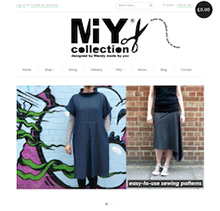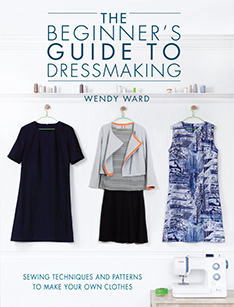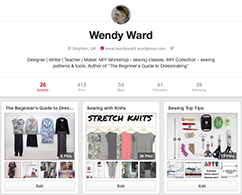I am often asked this question. There is no one simple answer. Obviously the first consideration is your budget. If you have £500+ at your disposal (you lucky thing!), go for a Bernina. They are the bees knees of sewing machines; solid and well made.
Also now snapping at the heels of Bernina and I believe challenging them for their number 1 spot are Juki, who make most of the world’s industrial sewing machines and are now successfully using some of that technology in their range of home sewing machines. I have used a Juki overlocker for a few years (see my post about whether or not you should buy an overlocker here) and since I’ve also started using a Juki sewing machine, I’ve found I’m now using it more than my Bernina or my industrial sewing machine.
If your budget can’t stretch that far, then worry not, an older Bernina could still be yours. Second-hand Berninas come up regularly because they are such well built machines and that means there are still a lot of them around in perfect working order. I got a second-hand one a few years ago for just under £300 (you can find them cheaper) and I even got a full one year guarantee with it which included parts! You would be lucky to get that with most new machines today, that’s how reliable Berninas are.
To get a decent starter sewing machine you’ll need a budget of approx. £200 – £250, at this price range (and less) there is a lot out there to choose from and that’s the problem; there is a lot of rubbish. In my opinion, you do get what you pay for, so if possible, save up, combine a few Christmas and birthday presents and get the best you can afford. If you want to buy a new machine, here are a few tips:
- don’t ever buy a sewing machine from somewhere like a discount supermarket, yes it might only be £50 but there’s a reason for that – they’re worse than useless;
- stick to these known brand names regardless of where you’re shopping: Juki, Janome, Elna, Pfaff, Frister Rossman, Husqvarna, Brother;
- buy from a shop that actually has machines out for you to use such as specialist sewing machine retailers and John Lewis. If you subsequently have a problem with the machine you can go back to the shop and they will be happy to give you some help.
A good alternative to buying a new machine is to go to a specialist sewing machine retailer and buy something second-hand, ideally that is made mostly of metal rather than plastic, brands like; Bernina, Pfaff, Frisster Rossman, Husqvarna, Elna.
Metal machines whilst seeming more impractical in terms of lugging them around, will be able to cope with more layers and thicker fabrics. They can also be easier to maintain and repair.
What should my sewing machine be able to do?
Avoid the many “all singing, all dancing” machines with loads of fancy stitches, I guarantee you won’t use them. All you need, especially on your first machine, is:
- straight stitch
- zig-zag stitch
- a small selection of stretch stitches
- buttonholes
- ability to control the stitch length and stitch width
- it should have a “free arm” (so you can slip sleeves and trouser legs under the needle easily)
“Nice-to-haves”:
- a speed control
- the ability to adjust the presser foot pressure (see more about what that actually means here!)
- and the ability to drop the feed dogs to do free embroidery.
If quilting rather than dressmaking is more your thing, have a read of Liz from Quilty Pleasures guide to buying a sewing machine for quilting here.
So there you have it, shop away. And remember…………..once you’ve bought your machine they love to be used so don’t shut it away in a cupboard!! Have a read of my post on “Progressive Sewing” for a suggested list of garments to make in which order; to make sure you keep learning new skills and practising existing ones.




















Pingback: Top 20 Beginner Sewing Questions (& Answers!) | Wendy Ward
Hi Wendy, I was wondering why you had not mentioned Singer, I have a Futura 2000 that I bought in 1978 that is still going strong and has made several wedding dresses brides maid dresses and most of my children’s clothes over the years. The biggest problem I have is finding bobbins to fit it. Moira
LikeLike
Hi Moira, I’ve tried to stick to recommending models/brands that I’ve had experience of using or seen students using. Some of the newer Singers I’ve had experience of have been awful, I would only recommend the older models probably the age of yours and older. Glad to hear yours has served you well and is still going strong! Wendy
LikeLike
Hi Wendy, I’ve just discovered your amazing website and I’m delighted to have read your advice about over lockers and about which sewing machine to buy. (I also am with WordPress, I design, make and sell Salstuff Doll Clothes online.) Later in the year I will be able to buy a new sewing machine, mine is a faithful Elna 2800 but I want something a bit more heavyweight with fancier stitches. I’d not heard before about World of Sewing at Tunbridge Wells and am delighted because I’m in East Kent, so it’s almost local to me! Thanks for your very clear advice – from Sal of Salstuff xx
LikeLike
Hi Sal, you’re very welcome, I’m glad my posts helped and thanks so much for taking the time to comment. Good luck with finding your new machine – exciting times!! If you have a trip to World of Sewing, enjoy :o) Wendy
LikeLiked by 1 person
Thanks Wendy. Wonderful advice. I’m so glad I found your site. I’m investing in a machine in the new year and I want to make clothes with jersey. Perfect!
LikeLike
Hi Kim, you’re welcome, I’m so pleased you found it useful and I hope you enjoy making clothes with jersey – I’m sure you will! Keep an eye on future posts as you’ve probably realised that working with stretch knit fabrics is one of my favourites!!
Wendy
LikeLike
Pingback: A new workshop! | Wendy Ward